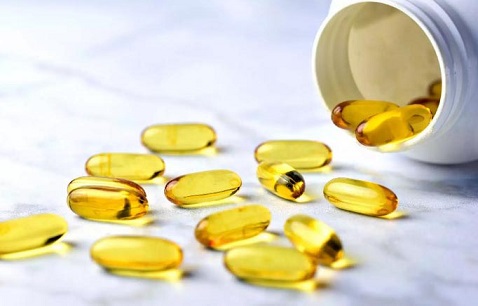Taiwanese study shows that polyunsaturated fatty acids show potential for treating COVID-19-induced anosmia
Nikhil Prasad Fact checked by:Thailand Medical News Team Sep 13, 2024 7 months, 1 week, 6 days, 13 hours, 33 minutes ago
Medical News: The ongoing COVID-19 pandemic has brought an array of symptoms to light, with anosmia, or loss of smell, being one of the most common. While the Omicron variant has shown a reduced prevalence of anosmia, it remains a significant concern for many. A study led by researchers from National Taiwan University Hospital, Kaohsiung Chang Gung Memorial Hospital, and Kaohsiung Medical University explores the potential of polyunsaturated fatty acids (PUFAs) as a treatment for COVID-19-induced anosmia. This
Medical News report delves into the therapeutic potential of PUFAs in restoring the sense of smell in those affected by COVID-19.
 Taiwanese study shows that polyunsaturated fatty acids show potential for treating
Taiwanese study shows that polyunsaturated fatty acids show potential for treating
COVID-19-induced anosmia
Understanding COVID-19-Induced Anosmia
COVID-19-induced anosmia affects a significant number of patients, and for some, the condition persists long after recovering from the virus. The loss of smell can have a profound impact on the quality of life, making everyday activities like eating and identifying dangers more difficult. Smell plays a vital role in our survival and well-being by influencing behaviors, memories, and emotions. The mechanisms behind this loss of smell in COVID-19 patients are complex. Researchers have identified the potential involvement of supporting cells in the olfactory epithelium, inflammation, and viral damage to neural pathways.
What Are Polyunsaturated Fatty Acids (PUFAs)?
PUFAs are a group of essential fatty acids that must be obtained through diet, as the body cannot produce them. They are divided into two main categories: omega-3 and omega-6 fatty acids. Omega-3 PUFAs, such as eicosapentaenoic acid (EPA) and docosahexaenoic acid (DHA), are known for their anti-inflammatory and neuroprotective properties. These fatty acids play a crucial role in maintaining the integrity of cell membranes, particularly in the brain and nervous system. In contrast, omega-6 PUFAs are involved in pro-inflammatory processes. A balanced intake of omega-3 and omega-6 fatty acids is essential for overall health, especially in regulating inflammatory responses.
The Study’s Findings on PUFAs and Anosmia
In the study conducted by the Taiwanese research institutions, researchers examined the role of PUFAs, particularly omega-3 fatty acids, in treating COVID-19-induced anosmia. The anti-inflammatory and neuroprotective properties of omega-3 PUFAs were found to have potential in aiding the recovery of olfactory function. The study focused on the ability of PUFAs to reduce inflammation in the olfactory epithelium and support the regeneration of olfactory receptor neurons.
However, the results of the study were not entirely conclusive. While some patients showed improvement in their sense of smell after supplementation with omega-3 PUFAs, others did not experience significant changes. A key factor in this variability may be the timing and dosage of PUFA supplementation, as well as the severity of anosmia in different patients. The researchers
noted that larger-scale studies with more rigorous controls are needed to confirm the therapeutic potential of PUFAs for COVID-19-induced anosmia.
Mechanisms of PUFAs in Restoring Olfactory Function
The therapeutic mechanisms of PUFAs in restoring olfactory function are multifaceted. One of the primary ways in which omega-3 PUFAs help is by reducing inflammation. In COVID-19 patients, inflammation in the olfactory epithelium can damage olfactory neurons, leading to anosmia. Omega-3 PUFAs are converted into specialized pro-resolving mediators (SPMs) that actively reduce inflammation and promote tissue repair. By lowering the levels of pro-inflammatory cytokines, such as TNF-α, omega-3 PUFAs help mitigate the damage caused by the virus to the olfactory system.
Another mechanism involves the neuroprotective effects of omega-3 PUFAs. These fatty acids are essential for maintaining the fluidity of cell membranes, which is crucial for the proper functioning of neurons. Omega-3 PUFAs also enhance mitochondrial function, which is important for energy production and cell survival. This neuroprotective role is particularly beneficial in preventing long-term damage to the olfactory system.
The Role of Omega-6 PUFAs in Anosmia
While omega-3 PUFAs are associated with anti-inflammatory effects, omega-6 PUFAs have a different role. Omega-6 fatty acids, particularly arachidonic acid (AA), are involved in the production of pro-inflammatory mediators. In the context of COVID-19-induced anosmia, an imbalance between omega-3 and omega-6 PUFAs may exacerbate inflammation, further damaging the olfactory system. Therefore, it is essential to maintain a balanced intake of these fatty acids to ensure optimal inflammatory responses.
Current Limitations and Future Research
Despite the promising potential of PUFAs in treating COVID-19-induced anosmia, there are several limitations to the current research. One of the main challenges is the inconsistency in study results. Some clinical trials showed positive outcomes with omega-3 PUFA supplementation, while others found no significant improvement. These mixed results highlight the need for more large-scale, placebo-controlled studies to better understand the therapeutic effects of PUFAs on anosmia.
Additionally, the timing of PUFA supplementation may play a crucial role in its effectiveness. Early intervention with PUFAs during the acute phase of COVID-19 infection could potentially prevent long-term anosmia. However, further research is needed to determine the optimal dosage and duration of PUFA supplementation for the best results.
Conclusion
The study conducted by the Taiwanese research institutions provides valuable insights into the potential of polyunsaturated fatty acids, particularly omega-3 PUFAs, as a treatment for COVID-19-induced anosmia. While the findings are not conclusive, the anti-inflammatory and neuroprotective properties of PUFAs offer hope for patients suffering from this debilitating condition. As research into the therapeutic mechanisms of PUFAs continues, there is potential for these fatty acids to become a part of future treatments for olfactory dysfunction.
The study findings were published in the peer-reviewed journal: Biomedicines.
https://www.mdpi.com/2227-9059/12/9/2085
For the latest COVID-19 News, keep on logging to Thailand
Medical News.
Read Also:
https://www.thailandmedical.news/news/study-shockingly-finds-that-those-who-develop-anosmia-during-covid-19-actually-end-up-with-brain-changes
https://www.thailandmedical.news/news/covid-19-symptoms-sars-cov-2-not-only-causes-anosmia-but-also-parosmia-or-smell-distortion-and-experiences-of-disgusting-smells-of-fish-and-sulphur
